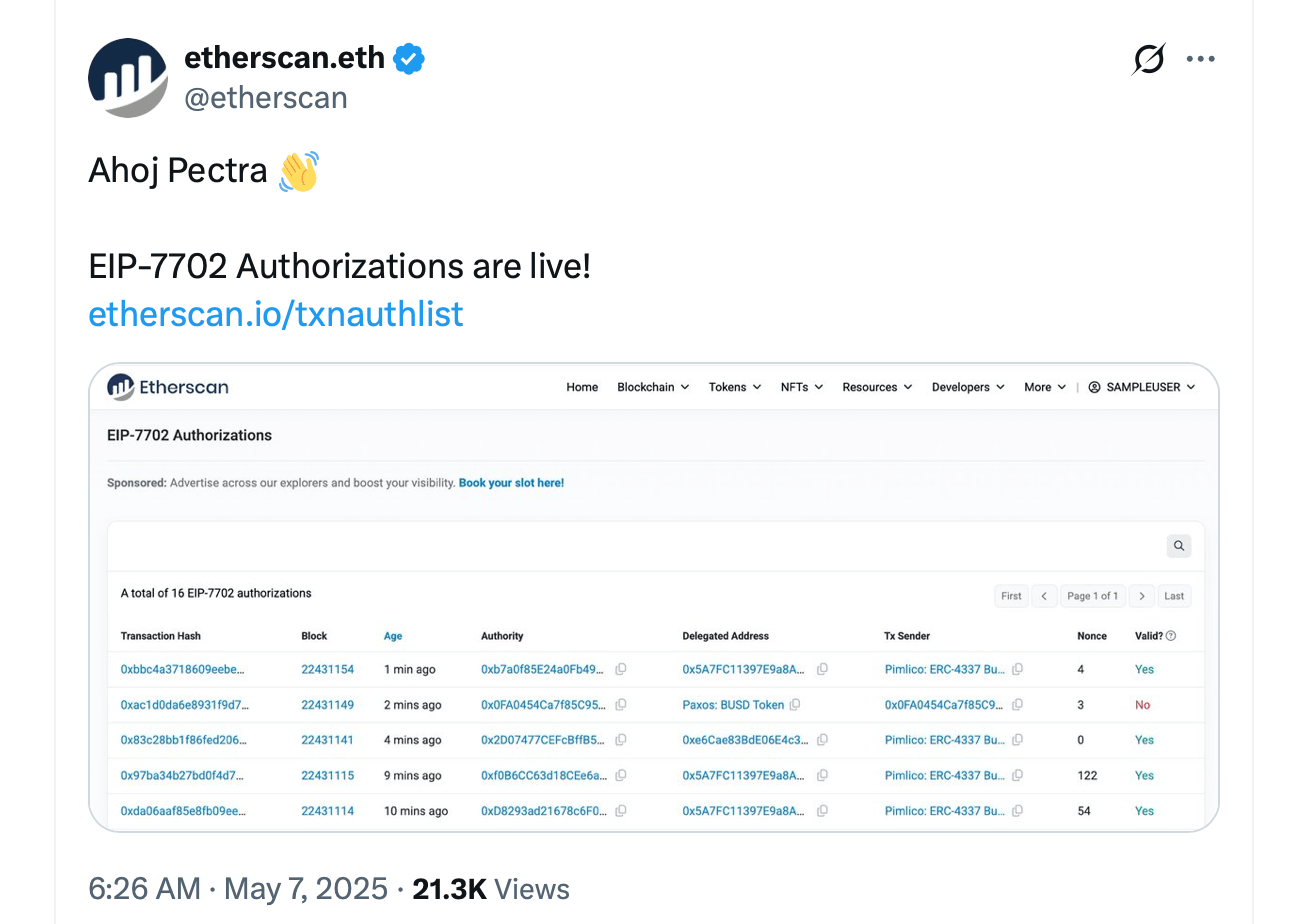In a move that can only be described as ‘another day, another Ethereum upgrade,’ Etherscan has rolled out a set of shiny new tools for tracking EIP-7702 authorizations, right on the heels of Ethereum’s latest and greatest upgrade: Pectra. Yes, it’s an upgrade, and yes, it’s trying to make the blockchain a bit more user-friendly—how quaint. This particular upgrade introduces 11 proposals aimed at making Ethereum more scalable, secure, and, well, maybe even a little easier to use.
Ethereum Users Get a Taste of Smart Contract Flexibility, Thanks to EIP-7702
So, on May 7, 2025, the Ethereum world was graced with the launch of the Pectra upgrade, a mix of the Prague and Electra updates that went live with a bang (or perhaps just a soft click) and rolled out 11 Ethereum Improvement Proposals, one of which was EIP-7702. This proposal is quite the game-changer—allowing externally owned accounts (EOAs) to temporarily pass the baton of transaction execution to smart contracts. Who knew EOAs were so generous?
 EIP-7702 introduces something called a “set code transaction” (0x04, for the geeks in the back). This clever little number allows an EOA to delegate its powers to a smart contract, provided you’re okay with putting a tiny bit of trust in code. Because, you know, what could possibly go wrong? You’ll get to authorize delegations through an “authorization_list,” and for those who get cold feet, the changes can be undone with a simple code-resetting transaction. You can batch your transactions, cover gas fees, and set up custom permissions—all without permanently transforming into a full-blown smart contract. How convenient!
EIP-7702 introduces something called a “set code transaction” (0x04, for the geeks in the back). This clever little number allows an EOA to delegate its powers to a smart contract, provided you’re okay with putting a tiny bit of trust in code. Because, you know, what could possibly go wrong? You’ll get to authorize delegations through an “authorization_list,” and for those who get cold feet, the changes can be undone with a simple code-resetting transaction. You can batch your transactions, cover gas fees, and set up custom permissions—all without permanently transforming into a full-blown smart contract. How convenient!
But wait—before you get too excited, let’s talk about the catch. As with all things blockchain, security is still a bit of a wild west. Delegating to an unvetted contract? Well, you might just open the door for all kinds of exploits. Plus, don’t get too comfortable with your nonces (yes, plural), because improper management could allow replay attacks. So, don’t forget to revoke your delegations before you fall victim to the blockchain boogeyman.
The new standard also plays nice with existing account abstraction frameworks, like ERC-4337, so it should be compatible with wallets and decentralized apps (because who doesn’t love interoperability?). EIP-7702 first made its debut on Ethereum’s Sepolia testnet, and now it’s live on the mainnet, thanks to the wonders of Pectra.
And let’s not forget Etherscan’s new tracking feature—because what’s an upgrade without a way to monitor it? The “Authorization List” tab will let users keep track of active and historical delegations, ensuring transparency for everyone involved (whether they want it or not).
As Ethereum slowly edges toward hybrid account models, EIP-7702 provides a delicate balance of flexibility and user sovereignty. Developers, it’s time to roll up your sleeves and prioritize security audits, because we all know how much blockchain fans love a good security breach.
Read More
- Does Oblivion Remastered have mod support?
- Thunderbolts: Marvel’s Next Box Office Disaster?
- 30 Best Couple/Wife Swap Movies You Need to See
- To Be Hero X: Everything You Need To Know About The Upcoming Anime
- DC: Dark Legion The Bleed & Hypertime Tracker Schedule
- Clair Obscur: Expedition 33 ending explained – Who should you side with?
- Elder Scrolls Oblivion Remastered: Best Paladin Build
- Summoners War Tier List – The Best Monsters to Recruit in 2025
- Clair Obscur: Expedition 33 – All Act 3 optional bosses and where to find them
- Skeet Ulrich Reportedly Set to Return For ‘Scream 7’
2025-05-07 20:41